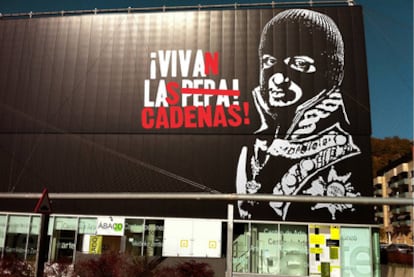Deconstructing the 1812 Constitution
The Magna Carta signed in Cádiz has been misrepresented and misunderstood for decades. This year's bicentenary celebrations aim to put those myths to rest
The Cádiz Constitution of 1812 had a similar fate to James Dean. They both died young, while still full of promise, and both have become legends in their own right. But was one really the best actor of his generation, and the other the starting point for democracy in Spain? Whatever the prevailing opinion about Dean, historians are very clear about the Magna Carta of 1812.
"It was legendary even though it was only in effect for a few years, because it set two precedents that formed the basis of the liberal political system: national sovereignty and the division of powers," says Emilio La Parra, a professor of contemporary history at Alicante University. "It cannot be said that it was the beginning of democracy because it did not recognize everybody's political rights: not women's, not indigenous people's, not blacks' and not slaves'; but it is probably one of our legal texts of reference."
"It was legendary even though it was only in effect for a few years"
This was not the birth of democracy, but the setting for a new political model
This year, the 200th anniversary of the 1812 Constitution is being observed in Cádiz, the city where it was proclaimed, with a host of activities celebrating a document that "established that people stopped being subjects and started being citizens," in the words of Francisco Menacho, president of the Consortium of the Bicentennial of the 1812 Constitution. For the first time, he says, sovereignty rested on "the nation," even if La Parra points out that "popular sovereignty," the real basis of democracy, would not be recognized until 1931.
The celebration comes after decades of historical revisions have finally put the document in its proper place, after many years of misrepresentation. What happened in 1812 was not the birth of democracy, per se, but the setting for a political model that broke with the old regime. And even though the Constitution was only in effect at first for 15 months, in a territory that was recovering from a war of liberation against Napoleon, and then again briefly between 1820 and 1823, it found a niche in liberal and popular imagery as an icon of freedom.
"Its symbolic power is huge," says Isabel Burdiel, winner of the 2011 National History Award for her biography of Queen Isabella II. "During the 19th and 20th centuries it embodied the myth of democracy, even if it contained traces of the 18th century. It was a Constitution that served as a bridge. It considered the notion of [male] citizenship and the rights attached to it, but its way of thinking belongs to the 18th century."
"We can now make a much more accurate reading of the 1812 Constitution if we remain aware that it is a lot more about maintaining the traditional world of villages and public corporations of the old state than about establishing an entirely new liberal state," notes Javier Barrientos, a member of Chile's History Academy.
Another hangover from the past is the monumental interference by the Church: the Spanish nation is declared to be Roman Catholic, the practice of all other faiths is forbidden, and the clergy is awarded all sorts of privileges.
Yet for a long time, a lot of historical falsehoods surrounded La Pepa ? a nickname derived from the fact that the Constitution was approved on March 19, Saint Joseph's Day; men named José are affectionately referred to as Pepe, with the female form of that nickname being "Pepa." To the phony notion that it was Spain's first democratic Constitution, we must add the claim that it prohibited the Inquisition. Emilio La Parra, who wrote his dissertation on this issue, is adamant: "That's a lie. The Inquisition was eliminated on February 23, 1813, nearly a year later, although it's true that deputies took the 1812 Constitution as a basis for considering its elimination."
In its article 303, the Cádiz Constitution expressly prohibited the use of torture on detainees, which certainly did not marry well with the techniques used during inquisitorial interrogations. Protection of the individual was the backbone of the Magna Carta, and in that sense it marked the first time that Spain recognized human rights (understood in their historical context ? that is to say, not applicable to women, blacks or indigenous people). Freedom of expression and freedom of the press were recognized, as well as the right to private property and personal safety. The ultimate goal of government was set down as "the happiness of the nation."
"Attaining happiness was one of the utopian goals of the Enlightenment," explains Alberto Ramos, a professor of contemporary history at Cádiz University. "Cádiz became a political school that influenced the Americas and Europe, as a role model of a country fighting for independence against an invading army yet still capable of conducting a political revolution."

Tu suscripción se está usando en otro dispositivo
¿Quieres añadir otro usuario a tu suscripción?
Si continúas leyendo en este dispositivo, no se podrá leer en el otro.
FlechaTu suscripción se está usando en otro dispositivo y solo puedes acceder a EL PAÍS desde un dispositivo a la vez.
Si quieres compartir tu cuenta, cambia tu suscripción a la modalidad Premium, así podrás añadir otro usuario. Cada uno accederá con su propia cuenta de email, lo que os permitirá personalizar vuestra experiencia en EL PAÍS.
¿Tienes una suscripción de empresa? Accede aquí para contratar más cuentas.
En el caso de no saber quién está usando tu cuenta, te recomendamos cambiar tu contraseña aquí.
Si decides continuar compartiendo tu cuenta, este mensaje se mostrará en tu dispositivo y en el de la otra persona que está usando tu cuenta de forma indefinida, afectando a tu experiencia de lectura. Puedes consultar aquí los términos y condiciones de la suscripción digital.








































